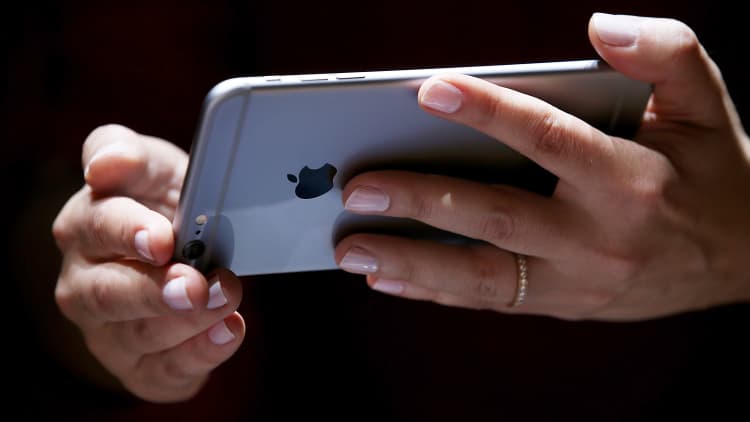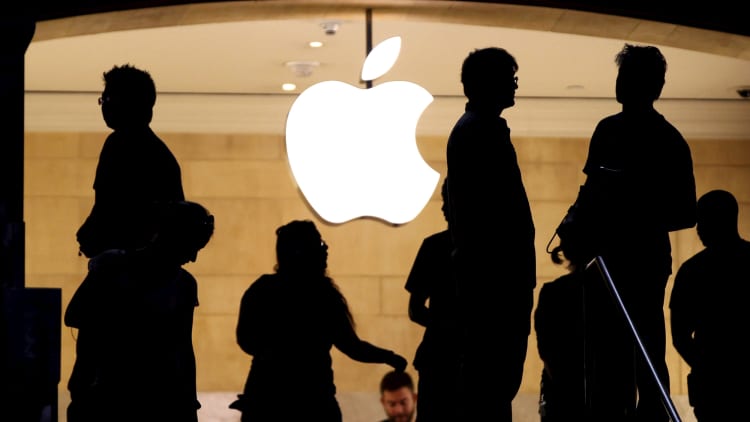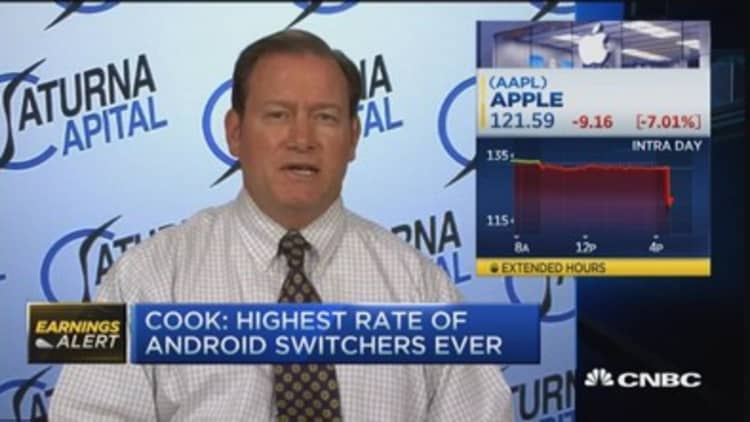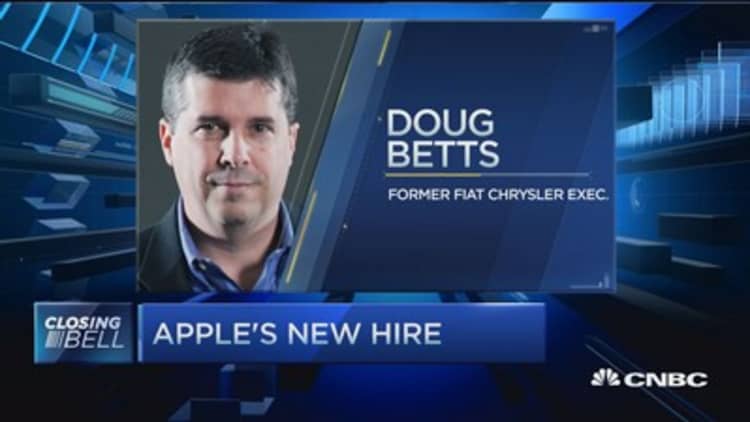



Apple reported quarterly earnings and revenue that barely beat analysts' expectations on Tuesday, but the tech giant's stock fell more than 6 percent in after-hours trading.
The company posted fiscal third-quarter earnings per share of $1.85 on revenue of $49.6 billion. Analysts expected Apple to report earnings of $1.81 a share on $49.43 billion in revenue, according to a consensus estimate from Thomson Reuters. (Tweet This)
In percentage terms, this is Apple's smallest EPS beat in two years. Shares fell more than 8 percent in after-hours trading before paring some of those losses. At $119.81, Apple was at one point down more than $63 billion in value since Tuesday's close—that's roughly equivalent to a Lockheed Martin or a Priceline.
Still, CEO Tim Cook said on the earnings call that the company was "proud" of its results, especially given a "challenging" foreign exchange environment. He also highlighted growth in China, and said Apple is going "pedal to the metal" there despite some worries about a recent drop in its equities markets.
Read More Apple's real earnings problem: The forecast
Shipments for the iPhone, Apple's biggest product category by unit sales and revenue, came in at 47.5 million, the company said. The iPhone remains a key data point for Apple's performance. Analysts were expecting 47.25 million shipments—down from a previously-announced 61.17 million the prior quarter.
Cook called the iPhone 6 is a runaway success, and that the product category is continuing to gain significant market share. On the call, he said that the phone's growth was triple the rate of the smartphone market overall.
"We sold more units than we thought we would," he said of the iPhone on the call. "We did exceptionally well in any way that you look at it."
He added that there is "a lot of headroom left for upgraders," as only 27 percent of the iPhone's install base have chosen to upgrade to an iPhone 6. "We are very confident that this quarter is going to be great," the CEO said of the ongoing fiscal fourth quarter, adding that the company is still seeing large numbers of first-time iPhone buyers.
Piper Jaffray analyst Gene Munster wrote in a note after the release that the extended-hours decline was because of disappointment in the iPhone number.
The iPad, meanwhile, shipped 10.9 million units (compared to 13.3 million in the year-ago period), according to Apple. Still, Cook said he remains "bullish" on the product, and that its upgrade cycle will "eventually occur."
Apple's third-quarter gross margin came in at 39.7 percent. Wall Street had expected gross margins of 39.5 percent, according to StreetAccount.
The tech giant's fiscal fourth-quarter revenue guidance was $49 billion to $51 billion. Gross margin guidance was between 38.5 percent and 39.5 percent. Consensus analyst expectations for that quarter were $50.85 billion in revenue, and 39.1 percent gross margins, according to StreetAccount.
"The guidance is really the issue," Daniel Ives, managing director in the technology, media and telecom research group of FBR Capital Markets, told CNBC of the after-hours fall.
Apple's cash pile broke above $200 billion for the first time ever, hitting $203 billion. That is up 5 percent from the prior quarter, and up 23 percent from last year. $181 billion of that cash horde was international, the company said.
Read More Just how much cash does Apple have?
Apple also revealed that it returned $13.8 billion in capital during the third quarter, including $10 billion in share buybacks.
Cook also addressed the company's performance in Greater China (including Hong Kong and Taiwan) on the call, calling the results "outstanding"—and that they are "particularly impressive" given weaker estimates for the region's smartphone market.
Greater China revenue for the quarter came in at $13.23 billion, compared to $6.23 billion in the year-ago period.
"We remain extremely bullish on China and we're continuing to invest," he said. "Nothing that's happened has changed our fundamental view that China will be Apple's largest market at some point in the future."
Still, the CEO acknowledged that China's stock market volatility could create "speed bumps" in the near term, but he added that the market is still up 20 percent year-to-date and participation is fairly narrow. He said that Apple sees the recent China worry as "overstated," and the company is keeping the "pedal to the metal" in its expansion there.
"We're still bullish on the China, on the iPhone story," Ives said. "But you definitely start to look at it a little closer over the type of numbers we're going to see over the next few quarters as it does come down to hardware, it does come down to iPhone 6."
On the Apple Watch, Cook said that the newest product has exceeded expectations, and that the company will expand point of sale for its watch. Other product revenues were $2.6 billion on the quarter—compared to $1.7 billion the prior quarter. Analysts were expecting $1.8 billion of watch sales alone (which are included in that "other" figure).
The third quarter marked the introduction of the Apple Watch, but sales for the tech giant's newest product were not singled out in the release. Still, Wall Street expected 3.87 million watch shipments, according to StreetAccount.
Piper's Munster wrote that Apple Watch sales were likely roughly 1.2 million units based on the "other" figure. Cook, however, said that "it would not be an accurate thing" to simply look at the change in that data point because other products like the iPod and accessories are seeing revenue shrinking.
Read More Singapore greets Apple Watch with a shrug
Providing a little more color on the watch, Cook said that sales of the watch exceeded internal expectations "despite supply still trailing demand at the end of the quarter." In fact, he said, the watch sell-through in the quarter was higher than the comparable launch periods of the original iPhone and the original iPad.
"As I look at all of these things, we feel really great about how we did," Cook said of the watch's entrance into the market. He boasted of the development work and future prospects for the watch's app environment.
Although the revenue for the watch doesn't yet represent a significant piece of Apple's business, some view it as an important data point for investors and analysts looking to the company's future. The Cupertino, California-based company benefits from a popular belief that it can continue to create hit products, and any hiccups could damage long-term growth expectations.
Retail and online store customer visits rose 49 percent year over year, driven in part by interest in the watch, CFO Luca Maestri said on the call.


